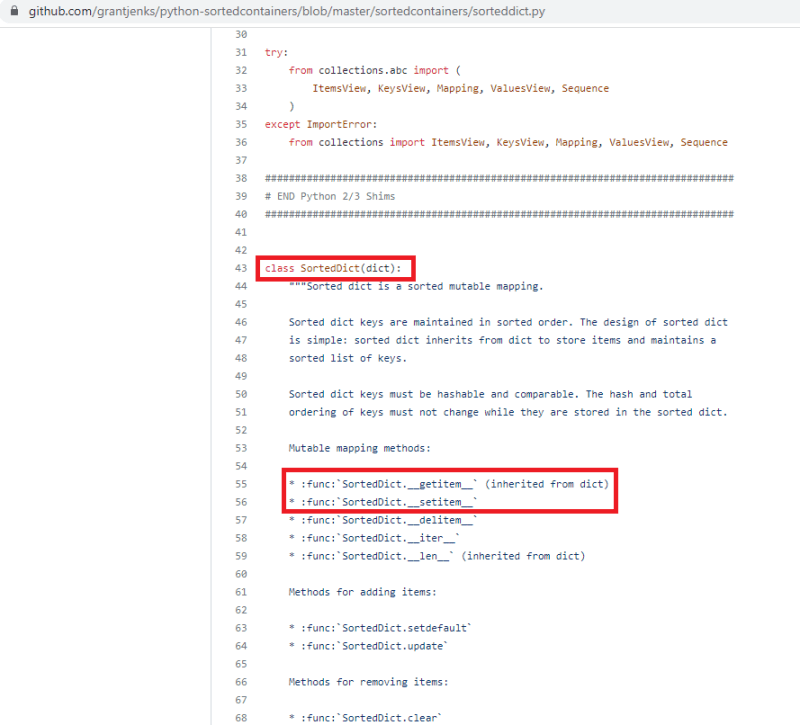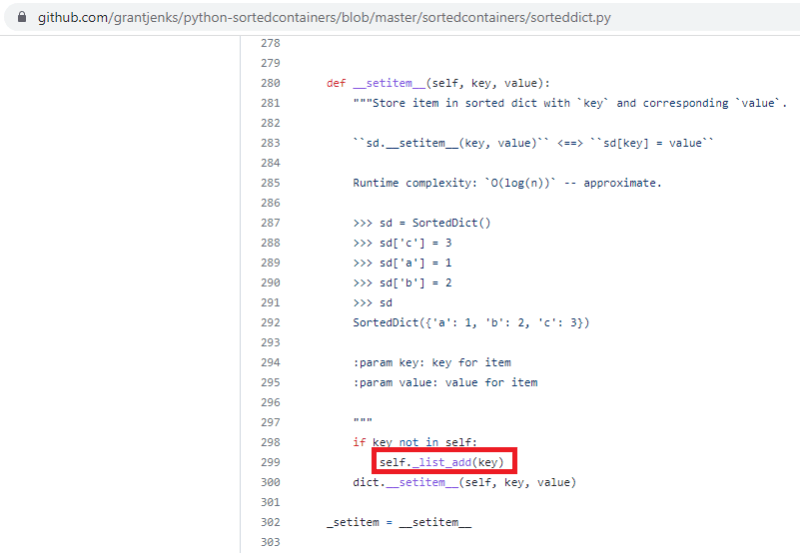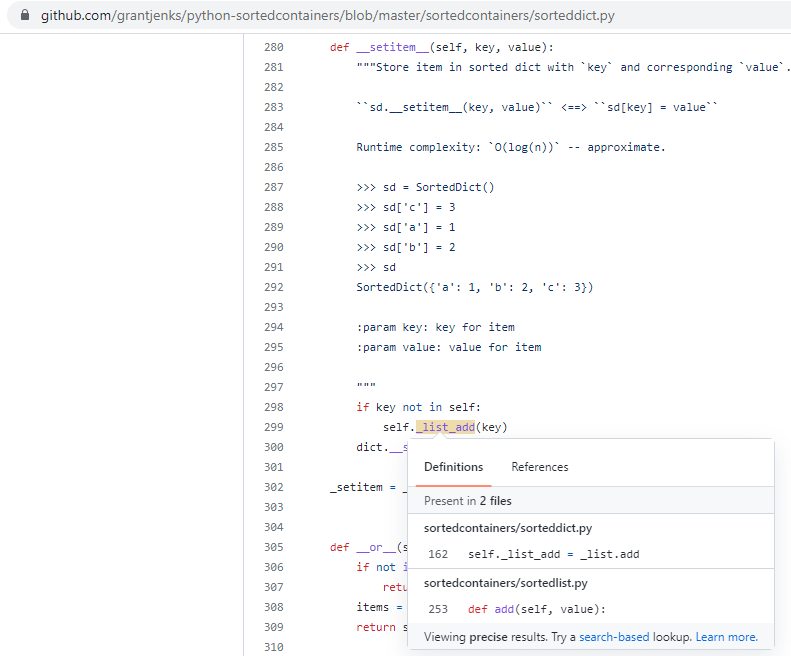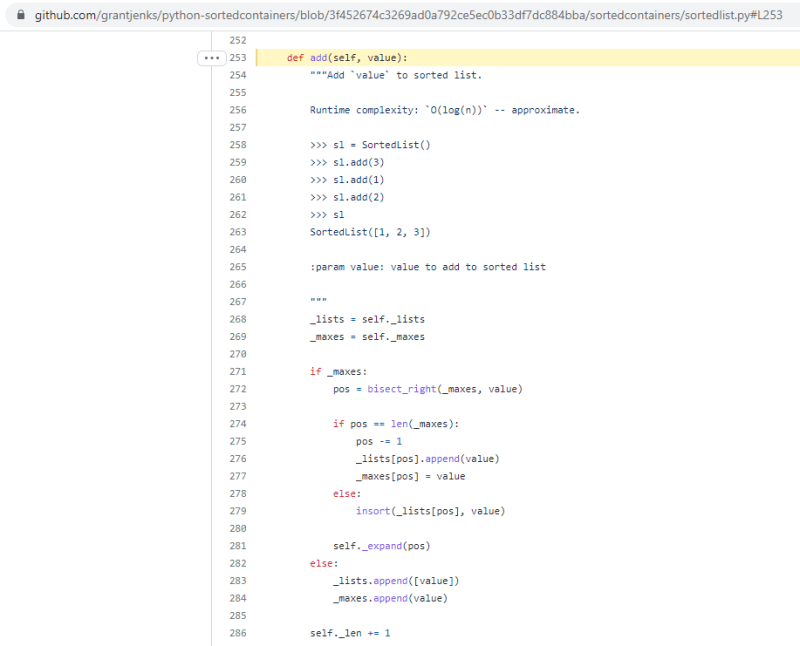A deep dive into sortedcontainers Source Code
About 1 year ago, I solved this question in Amazon Berlin's phone screen. But without the optimal time complexity. Many times since then, I have wondered how to do it better.
Today I encountered it again in Leetcode's Daily Challenge.
Turns out the missing part is a data structure unbeknownst to me then -- Sorted Dictionary. So here are the findings for the day, including a deep dive into the Python source code for this. Beyond being a journal, I hope this post helps people:
- realize it's not that scary to dig into Python source code,
- learn a new data structure.
Checking the Leetcode Solution
from sortedcontainers import SortedDict
class MyCalendarThree(object):
def __init__(self):
self.diff = SortedDict()
def book(self, start, end):
"""
:type start: int
:type end: int
:rtype: int
"""
self.diff[start] = self.diff.get(start, 0) + 1
self.diff[end] = self.diff.get(end, 0) - 1
maxK = k = 0
for val in self.diff.values():
k += val
maxK = max(maxK, k)
return maxK
My goodness, so the question that has been haunting me was so simple?!
No, it just looks deceptively simple because of the abstracted logic in SortedDict(), which we'll look at in a bit, but first, a thing on lazy engineers...
Sorting the Standard Python Dictionary, dict()
I recall hearing that best engineers are the lazy ones. This is because they find the easiest way to do things, which is the essence of our efficiency-obsessed world (wait a minute, is that why we're having layoffs?).
In spirit of that, I tried to hack it with my existing knowledge of the standard Python dict() function. The whole article is below, but TLDR; it didn't work. Too much tuple/list/dict conversions and lambda expressions that seemed too crazy for a Leetcode Hard question, which is expected to be completed within 1 hour (mentioned by a Google engineer).
https://realpython.com/sort-python-dictionary/#sorting-dictionaries-in-python
Diving into sortedcontainers
Since we wrote from sortedcontainers import SortedDict, let's look for SortedDict() first!
Mmm.. it has pretty good documentation, quite quickly we can see the methods we need __getItem__ and __setItem__
Since __getItem__ is inherited from dict, then there is no point to explore that, we already know the function.
__setItem__ is the interesting one.
Wait.. what is that self._list_add(key)?
Looks like it involves some binary search and insert.
Gathering the ingredients
Now we know SortedDict() implementation involves:
- A sorted list to track order of keys in the hashmap (since keys in hashmap are not ordered).
- Binary Search and Insert to the sorted list.
Final Solution
class MyCalendarThree(object):
def __init__(self):
self.diff = {}
self.sortedIdx = []
def book(self, start, end):
"""
:type start: int
:type end: int
:rtype: int
"""
def binarySearchAndInsert(arr, target):
l, r = 0, len(arr)-1
while l <= r:
mid = l + (r-l)//2
if arr[mid] > target:
r = mid - 1
else:
l = mid + 1
arr.insert(l, target)
return arr
if start not in self.diff:
self.sortedIdx = binarySearchAndInsert(self.sortedIdx, start)
self.diff[start] = self.diff.get(start,0) + 1
if end not in self.diff:
self.sortedIdx = binarySearchAndInsert(self.sortedIdx, end)
self.diff[end] = self.diff.get(end,0) - 1
maxK = k = 0
for idx in self.sortedIdx:
val = self.diff[idx]
k += val
maxK = max(maxK, k)
return maxK
Conclusion
The full Leetcode discussion post I wrote is linked here.
Besides that, I think I'll continue to be a lazy engineer and just use a SortedDict() next time a similar question comes up 😎











Top comments (0)